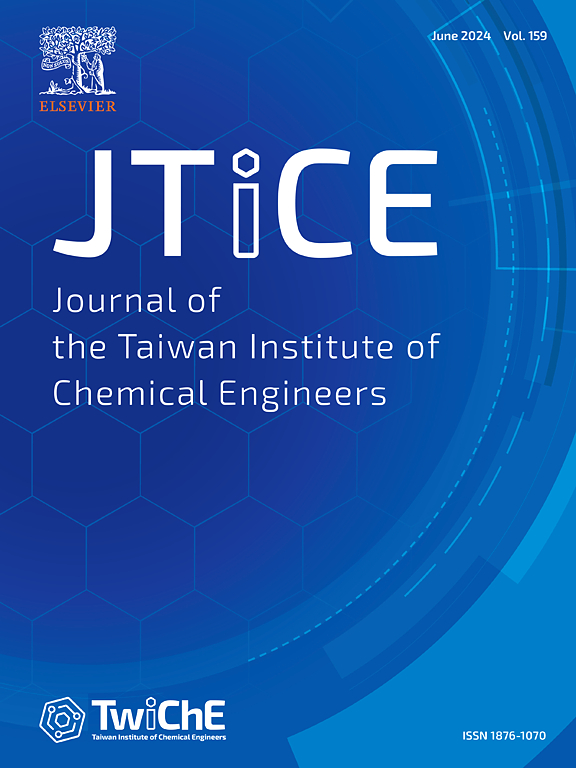Eco-friendly corrosion protection for carbon steel: A study on natural inhibitors in artificial seawater and acidic environments
IF 5.5
3区 工程技术
Q1 ENGINEERING, CHEMICAL
Journal of the Taiwan Institute of Chemical Engineers
Pub Date : 2025-04-04
DOI:10.1016/j.jtice.2025.106112
引用次数: 0
Abstract
Background
Inexpensive and environmentally friendly alternatives are needed to replace traditional organic inhibitors, as they are high in cost and pose risks to both human health and the environment. This study evaluated the performance of Cynodon Radiatus (CR) extract and its isolated constituent for inhibiting corrosion under artificial seawater in carbon steel and evaluated the inhibitors in acid-cleaning solutions for desalination plants.
Methods
The inhibitor-isolated constituents were analysed using FTIR spectroscopy. The electrochemical (polarisation, bode plot and impedance spectroscopy) and gravimetric methods were used to evaluate the corrosion inhibition performance and confirm the Langmuir adsorption isotherm. FESEM studies confirmed the development of protective layers under inhibiting conditions.
Significant Findings
The results exposed that the CR plant essences performed as a mixed-type protector along with a high inhibition efficiency (IE) of 96.9 % in an acid-cleaning medium compared to artificial seawater (91.4 %). In addition, the isolated constituents displayed a high IE (97.2 %) compared with whole plant extract under an acid medium. The high IE was credited to the adsorbing of inhibitor molecules by the metal surface as defined in the surface coverage and absorption processes. The Langmuir profile was used to describe the appropriate mechanism for the adsorption process of extract. These results indicate that the extract functions as a powerful and cheapest anticorrosive agent.
碳钢的环保防腐:天然缓蚀剂在人工海水和酸性环境中的研究
传统的有机抑制剂成本高且对人类健康和环境构成风险,因此需要昂贵且环保的替代品来取代它们。本研究评价了Cynodon Radiatus (CR)提取物及其分离成分对碳钢在人工海水下的缓蚀性能,并评价了其在海水淡化厂酸洗溶液中的缓蚀性能。方法采用傅里叶红外光谱法对抑制剂分离成分进行分析。采用电化学(极化、波德图和阻抗谱)和重量法评价了其缓蚀性能,并确定了Langmuir吸附等温线。FESEM研究证实了在抑制条件下保护层的发育。结果表明,与人工海水(91.4%)相比,CR植物精华在酸洗介质中具有96.9%的高抑制效率(IE),是一种混合型保护剂。此外,与全植物提取物相比,分离得到的成分在酸性培养基中具有较高的IE(97.2%)。高IE归功于表面覆盖和吸收过程中定义的金属表面对抑制剂分子的吸附。用Langmuir曲线描述了萃取物吸附过程的适宜机理。这些结果表明,该提取物是一种功能强大、价格低廉的防腐蚀剂。
本文章由计算机程序翻译,如有差异,请以英文原文为准。
求助全文
约1分钟内获得全文
求助全文
来源期刊
CiteScore
9.10
自引率
14.00%
发文量
362
审稿时长
35 days
期刊介绍:
Journal of the Taiwan Institute of Chemical Engineers (formerly known as Journal of the Chinese Institute of Chemical Engineers) publishes original works, from fundamental principles to practical applications, in the broad field of chemical engineering with special focus on three aspects: Chemical and Biomolecular Science and Technology, Energy and Environmental Science and Technology, and Materials Science and Technology. Authors should choose for their manuscript an appropriate aspect section and a few related classifications when submitting to the journal online.

 求助内容:
求助内容: 应助结果提醒方式:
应助结果提醒方式:


